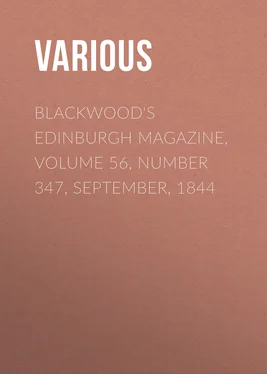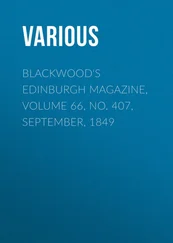Various - Blackwood's Edinburgh Magazine, Volume 56, Number 347, September, 1844
Здесь есть возможность читать онлайн «Various - Blackwood's Edinburgh Magazine, Volume 56, Number 347, September, 1844» — ознакомительный отрывок электронной книги совершенно бесплатно, а после прочтения отрывка купить полную версию. В некоторых случаях можно слушать аудио, скачать через торрент в формате fb2 и присутствует краткое содержание. Издательство: Иностранный паблик, Жанр: foreign_antique, periodic, foreign_edu, на английском языке. Описание произведения, (предисловие) а так же отзывы посетителей доступны на портале библиотеки ЛибКат.
- Название:Blackwood's Edinburgh Magazine, Volume 56, Number 347, September, 1844
- Автор:
- Издательство:Иностранный паблик
- Жанр:
- Год:неизвестен
- ISBN:нет данных
- Рейтинг книги:3 / 5. Голосов: 1
-
Избранное:Добавить в избранное
- Отзывы:
-
Ваша оценка:
- 60
- 1
- 2
- 3
- 4
- 5
Blackwood's Edinburgh Magazine, Volume 56, Number 347, September, 1844: краткое содержание, описание и аннотация
Предлагаем к чтению аннотацию, описание, краткое содержание или предисловие (зависит от того, что написал сам автор книги «Blackwood's Edinburgh Magazine, Volume 56, Number 347, September, 1844»). Если вы не нашли необходимую информацию о книге — напишите в комментариях, мы постараемся отыскать её.
Blackwood's Edinburgh Magazine, Volume 56, Number 347, September, 1844 — читать онлайн ознакомительный отрывок
Ниже представлен текст книги, разбитый по страницам. Система сохранения места последней прочитанной страницы, позволяет с удобством читать онлайн бесплатно книгу «Blackwood's Edinburgh Magazine, Volume 56, Number 347, September, 1844», без необходимости каждый раз заново искать на чём Вы остановились. Поставьте закладку, и сможете в любой момент перейти на страницу, на которой закончили чтение.
Интервал:
Закладка:
Various
Blackwood's Edinburgh Magazine, Volume 56, Number 347, September, 1844
M. LOUIS BLANC 1 1 Histoire de Dix Ans , 1830-1840. Par M. Louis Blanc.
M. Louis Blanc, a democratic journalist, with all, and perhaps more than the usual talents of the Parisian journalist—with all, and more than the usual faults of one—has undertaken to write the history of his country, during and since the revolution of 1830. What can we expect to be the result of such an undertaking? What can we expect from a man who sits down to a task of this description, animated with all the party virulence which gives zest to a democratic newspaper? It is not a history, but a scandal, that he will write. M. Louis Blanc has distilled the bile of journalism; he has paused over the hasty sarcasm which political animosity deals forth, not to correct, or moderate, or abate, but merely to point and envenom it. His appreciation of men, their character, their talents, their designs—all bear the hue of the atrabilious journalist. There is this difference only between his history and the daily portion of envy and malignity which a democratic newspaper pours forth, that the dye is more deeply engrained. In the mind of the author, the stain of his party has become ineffaceable. Those who are pleased—and the number is not few—with having high names and established reputations laid at their feet, soiled, trod upon, will meet here with ample gratification. To be sure they will be occasionally required, in lieu of such as they have thrown down, to set up the bust of some democratic celebrity, whose greatness, or whose genius, they were not previously aware of. But, not to say that the justice of party requires this substitution, it is a penalty which writers of this description will invariably impose upon them. It is the common trick of the envious, and the mock magnanimity with which they seek to conceal their true nature—to exalt the lowly, while they debase the exalted. Since some idol there must be, let it be one of their raising. Even while helping to raise it, they enjoy, too, the secret consciousness that it is of brittle metal.
But in the composition of a history, the spirit of party, however eager it may be, cannot always guide the pen. The mere interest of the narrative, the strangeness and peculiarity of circumstances, will claim their share of the author’s mind. The politician must sometimes be absorbed in the chronicler; and so it happens with M. Louis Blanc. His narrative often interests by its details; and if it has the partiality, it has also the vivacious colouring, of a contemporary. It possesses, also, a richness of anecdote—the fruit, probably, of his position as a journalist; add to which, that M. Louis Blanc is not without a species of off-hand, dashing eloquence. He can say daring things in a daring manner, and give the pungency of epigram to his political paradoxes. He has a full share of that rhetoric of journalism which is so well calculated to make an impression on the careless reader, but which requires that the reader should continue careless, in order to retain the impression he has received. It results from all this, that while we constantly distrust our guide, while we perpetually refuse the appreciation he offers to us of men and events, we still read on with interest a work which is, at least, relieved from the charge of insipidity or dulness; and indeed, if we had not derived some entertainment from its perusal, we should not have thought of bringing it under the notice of our readers. To have engaged ourselves merely in combating its errors and misrepresentations, would have been a dreary and an endless task.
To enable the reader at once to judge of the tone and temper of M. Louis Blanc’s politics, we present him the following passage. It is the object of the long Introduction which precedes his history, to show that the events which have transpired in France since 1793, have had, for their great result, the establishment of the government of the middle classes through a Chamber of Deputies—a view which we think is incontestably right. That France has its House of Commons, is the great fruit of all its struggles, its calamities, and its victories. It must not be supposed, however, that this is a result in which M. Louis Blanc rejoices. Nothing he so much detests as this government of the middle classes; nor is there any portion of society he vilifies more cordially than the bourgeoisie . Hear how he speaks of them. After relating the history of the Carbonari, who troubled by their plots the reign of Louis XVIII., he says:—“This Carbonarism never descended into the depths of society; it never moved the lower strata. How, then, could it be preserved from the vices of the middle class—egoism, littleness of ideas, extreme love of a mere material happiness, gross instincts!”—(P. 115.) So that he finds Carbonarism to have lacked in virtue, because it had not descended, for its disciples, sufficiently low in the scale of society!—to have grown corrupt, by reason of its not having penetrated to the “lower strata!” And yet the duties of the Carbonari seem to have been precisely calculated for these lower strata. These were, he had already told us himself, “to have a gun and fifty cartridges, to be ready to devote one’s-self, and to obey blindly the orders of unknown leaders.”—(P. 101.)
When we describe M. Louis Blanc as a democrat, it is rather for want of a better and more accurate title, than because this exactly describes him. A democrat is generally understood to be one who has a large faith in the lowest class of the people, such as they really exist; our author has a faith only in the future of this class. He does not fail to give vent, when the occasion prompts him, to his compassion or contempt for the ignorant mass of mankind. The democracy he worships is one to be established in some distant age, by a people very different, and living under some modification of the law of property, which he has not thought fit to explain. It is a democracy which has nothing distinct but its hatreds—a shadowy monster, peculiarly disagreeable to deal with. Our historian writes with overflowing gall against kings, against aristocracies, against the middle class. You would say he is a stanch republican, and that the people are to be his depositaries of power. But no; a lamentation, which escapes him from time to time—as bitter as any which Tory or Legitimist would utter—over the blindness of the people, their passions and their ignorance, contradicts this conclusion. Where is the power, and in whom lodged, that M. Louis Blanc would willingly obey, or see obeyed? It exists nowhere. Society is corrupt, is chaotic; nor can it, by any organ it possesses, exercise a sound or rational power. A new era must arise—how, whence, when, we are not instructed.
It is the peculiar characteristic of French democracy, that there is always mixed up with it the principle, more or less distinctly avowed, of the community of goods. Perhaps the vagueness we complain of in M. Louis Blanc, is dictated by mere prudence; perhaps there is no vagueness to the eye of a propagandist. One sentiment of French democracy he certainly expresses with sufficient hardihood. It is not often we meet with the principle of intervention between state and state, asserted in these days with so much boldness as in the following passage:—“Men have stigmatized the war in Spain, calling the principle of intervention an oppressive principle. Puerile accusation! All people are brothers, and all revolutions cosmopolite. When a government believes that it represents a just cause, let it make it triumph wherever a triumph is possible. This is its right; it is more—it is its duty.”—( Introduction , p. 120.)
Читать дальшеИнтервал:
Закладка:
Похожие книги на «Blackwood's Edinburgh Magazine, Volume 56, Number 347, September, 1844»
Представляем Вашему вниманию похожие книги на «Blackwood's Edinburgh Magazine, Volume 56, Number 347, September, 1844» списком для выбора. Мы отобрали схожую по названию и смыслу литературу в надежде предоставить читателям больше вариантов отыскать новые, интересные, ещё непрочитанные произведения.
Обсуждение, отзывы о книге «Blackwood's Edinburgh Magazine, Volume 56, Number 347, September, 1844» и просто собственные мнения читателей. Оставьте ваши комментарии, напишите, что Вы думаете о произведении, его смысле или главных героях. Укажите что конкретно понравилось, а что нет, и почему Вы так считаете.












